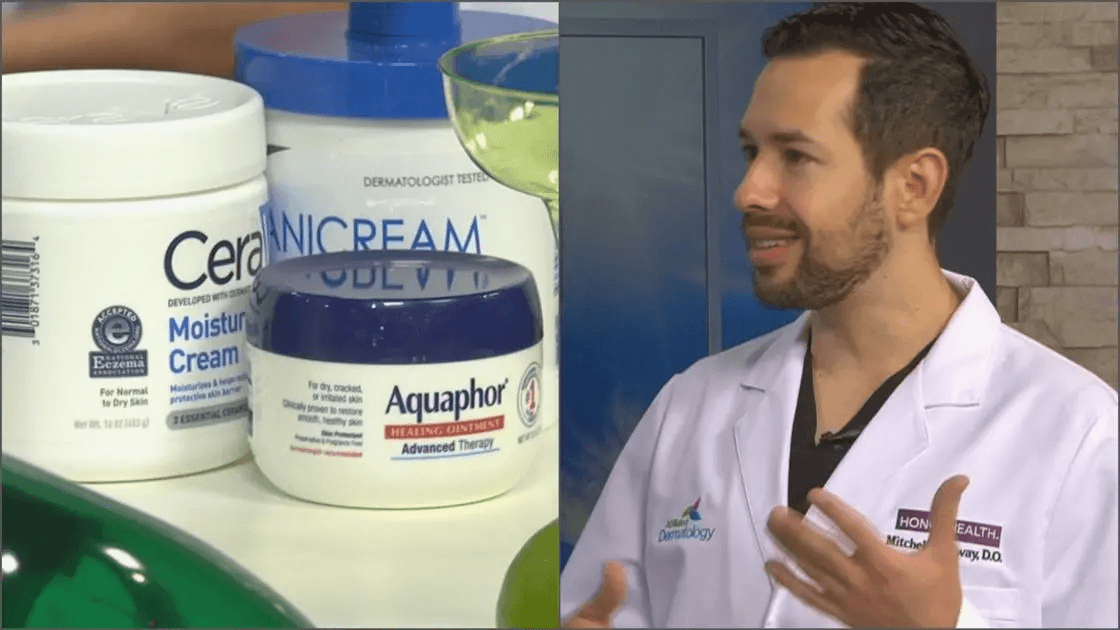While most of us know about the dangers of sunburns, not everyone is aware of other common summer hazards to our skin. Dry skin, razor burn, and molluscum contagiosum are just a few of the summer skin problems that Dr. Manway covers with Gina Maravilla on Good Morning Arizona! Swimming pools, hot tubs, and air conditioning can all negatively impact our skin. Dr. Mitchell Manway of Affiliated Dermatology explains some of the most common summer skin problems and how to deal with them.
Hot Tub Rash
If certain bacteria are living in the water you could develop itchy, acne-like bumps all over your body called hot tub folliculitis.
To prevent: make sure chlorine and pH levels are adequate to kill bacteria. The Centers for Disease Control and Prevention recommends pH 7.2 – 7.8 and a free chlorine concentration of at least 3 ppm in hot tubs/spas and 1 ppm in pools.
Body Acne
Wearing tank tops and swimsuits can lead to clogged pores as sweat mixes with bacteria and oils on your skin. Sitting around in a wet bathing suit can lead to friction and cause blemishes to brew on your bottom.
To prevent: blot sweat, don’t wipe, with a clean towel or cloth. Wash sweaty clothes, towels and hats, and thoroughly clean swimsuits before wearing again.
Margarita Rash
Limes (and lemons) contain photosensitizing agents called psoralens, which can cause a sunburn-like reaction when they come in contact with skin. Bartenders and those exposed to higher concentrations of psoralens with a longer period of UVA exposure could have a blistering reaction.
To prevent: wash hands thoroughly after contact or avoid psoralen containing foods and beverages while in the sun.
Molluscum Contagiosum
As the name implies, this virus is highly contagious. Most common among children, it spreads easily through contact with contaminated objects like toys and towels.
Symptoms include small, raised, round and flesh-colored bumps anywhere on the body that can become inflamed and itchy.
To prevent the spread: keep your hands clean, do not share personal items, cover bumps with a watertight bandage if swimming or when exposed to direct contact with others.
Yeast Infection
Tinea veriscolor is caused by a type of yeast that naturally lives on your skin. Living in a hot climate and sweating a lot can cause the yeast to grow out of control and produce a rash.
The condition is not contagious and patches of skin may be lighter or darker than the skin around them. Spots may occur anywhere on your body but are most common on your neck, chest, and back.
To prevent: limit sun exposure, avoid tight clothing, wear breathable fabric and avoid oily skin products.
Dry Skin
Sun, swimming and air conditioning can contribute to dry, irritated skin.
Razor Burn
Caused by shaving too closely or too harshly. A dull razor can also cause bumps and inflammation.
To prevent: cleanse thoroughly before shaving to open pores, use a good razor and high-quality cream, and always moisturize after shaving.
Broken Blood Vessels
Too much sun exposure can cause your blood vessels to rise to the surface and even burst.
To prevent: use sunscreen and avoid sun exposure.
Sun Allergy
Certain medications can cause allergic skin reactions and lead to red, itchy hives.
To prevent: check your medication, use sunscreen and avoid exposure.
Sunburn
Overexposure to ultraviolet (UV) rays can lead to red or reddish skin that is painful and hot to the touch and can increase your risk of getting skin cancer.
To prevent: wear a hat and sunglasses; apply SPF30+ sunscreen that provides protection from both UVA and UVB and re-apply every two hours or immediately after swimming or sweating.
We have been having so much fun traveling around the Valley sharing our best skin tips with our community. If you have any concerns or notice any changes in your skin, do not hesitate to make an appointment! For more information about Affiliated Dermatology, check out affderm.com.



